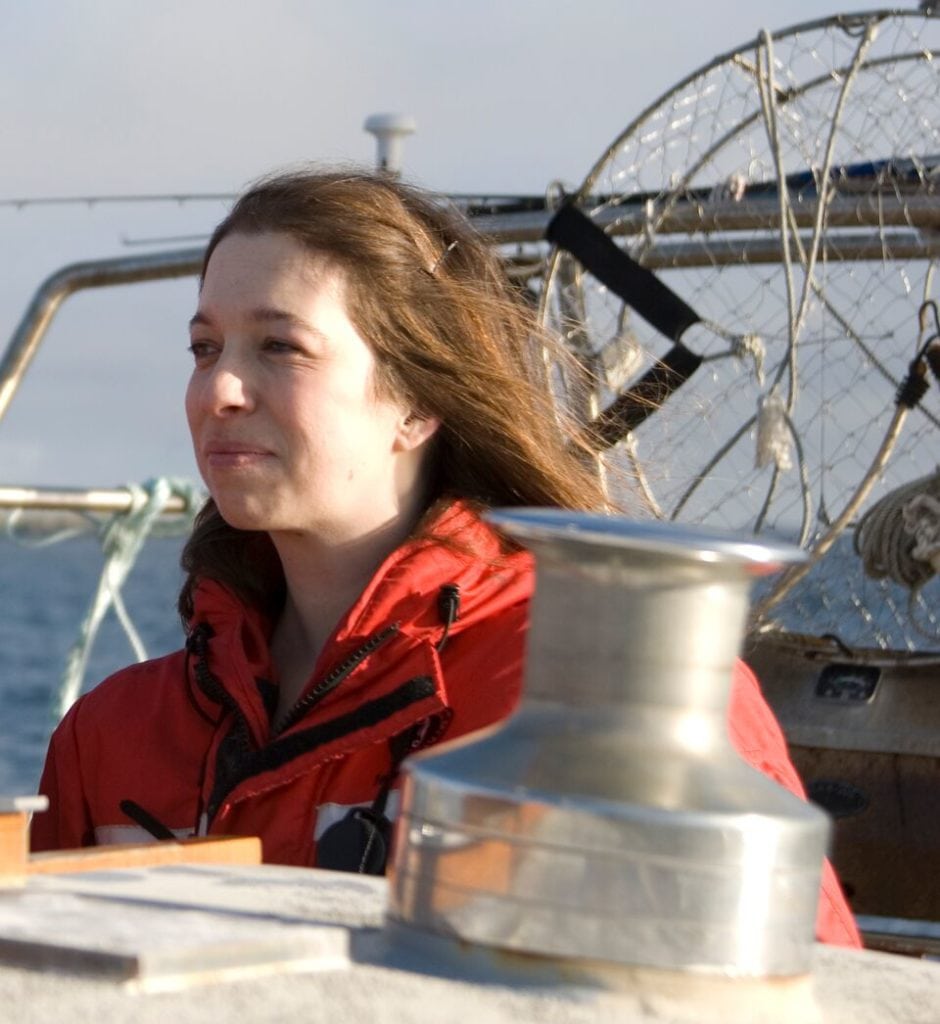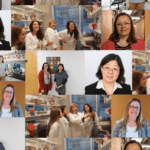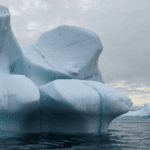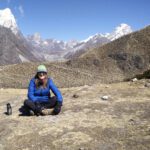Caroline Fox didn’t plan to become a scientist. In fact, as a child she wanted to be a musician, an astronaut, or a firefighter. “I work with quite a few people who’ve wanted to be marine biologists since they were children,” she says. “This wasn’t my experience.” Her parents were both teachers—her dad a college geography professor. “My parents immigrated to Canada from the UK, and the wildlife and wild spaces of the country made a big impression on us,” she recalls. “I spent a lot of time outdoors as a kid.”

So what made Fox choose biology? “I had a good high school biology teacher,” she says. “Plus during my undergrad degree I took several classes and did a directed studies project with Dr. Tom Reimchen, who exposed me to ecology and conservation biology. Later, I met Dr. Paul Paquet. The two of them played a major role in my decision to continue doing grad work in biological sciences, and Reimchen eventually became my PhD supervisor.”
Fox received her BSc (2003) in Biology and Environmental Studies from the University of Victoria. After her BSc, she worked as a research assistant for a year at the Bamfield Marine Sciences Centre, before heading to Case Western Reserve University (CWRU) to do an MSc (2006) with Dr. Andrew Swanson. “The choice to go to CWRU was largely serendipity,” recalls Fox. “I had experience working on kelp forest ecosystems and Swanson, who was a new professor there, had strong ties to my colleagues and invited me onboard as an MSc student.” (Swanson is now the CEO of the Verschuren Centre for Sustainability in Energy and the Environment at Cape Breton University.)
For her MSc, Fox focused on kelp forest ecology and the consequences of climate change on kelp species and associated food webs. After completing her MSc, Fox worked for two years at a number of positions: lighthouse keeper, creel observer, aerial surveyor for Fisheries and Oceans Canada (still the best job she’s ever had!), and as a biologist for the Raincoast Conservation Foundation.
Fox decided to return to the University of Victoria for a PhD (2013) where she was supervised by Reimchen with mentorship from Paquet. Fox focused on land–sea ecological interactions that involved nearshore spawning fish like Pacific herring, which required that she study everything from kelp and limpets to the herring themselves plus land-based mammals such as bears and wolves.
Following her PhD, Fox did a postdoc with Paquet on at-sea marine bird species. She focused on their distribution, abundances, and species–habitat relationships; did some predictive marine bird modelling; and developed spatial risk assessments for marine birds and industrial activity. Fox is currently in her second postdoctoral position at Dr. Chris Taggart’s Fisheries Oceanography Lab at Dalhousie University. As a Killam Postdoctoral Fellow, she’s studying endangered whales and their ecosystems. “In some ways it’s a significant departure from my PhD,” she says. “But the underlying uncertainties, ecological questions, and analytical approaches aren’t that different.”
Fox finds that it can be challenging to find funding for conservation science, though she’s managed over the years to balance sufficiently funded projects (such as her current postdoc) with those operating on a shoestring budget (her first postdoc position). “My first postdoc was higher risk and perhaps more on the fringes of so-called mainstream conservation,” she explains. “We piggy-backed a marine bird project on a large marine mammal project, but needed more funds for the marine bird data analysis and to publish in scientific journals. Because it was a worthwhile, high conservation impact project, we pieced together a relatively minimal amount of funding to finish the project.”
Though Fox’s career path seems relatively straightforward, it deviates from the classic academic pattern given her extensive participation in advocacy, science communication, and science policy.
As a conservation biologist, Fox is concerned not only with research, but with actively improving conditions for at-risk species. Fox has worked for the NGO Raincoast Conservation Foundationfor approximately 10 years. “I consider advocacy for nature and science communication as part of my job as a scientist,” she says. “In the broadest sense, I think they can be highly effective in terms of influencing conservation outcomes.” Though her science communication work with Raincoast has been necessarily limited during her current postdoc at Dalhousie, Fox sees much of her outreach, advocacy, and science communication efforts as being linked to Raincoast and collaborating organizations.
Fox has also written a book: At Sea with the Marine Birds of the Raincoast. “It’s still uncommon in the natural sciences for researchers to write a book,” says Fox. “My book is a combination of natural sciences, environmental history, conservation, science communication, and advocacy about marine birds. Following a 7,000 km at-sea survey of marine birds in BC, it’s directly related to the research I did during my first postdoc. My goal was to inform readers about marine birds, the wild offshore ecosystems of the BC coast, and the conservation issues faced by marine birds in BC.”
Fox’s outreach and advocacy extends into the science policy world, and is mainly related to environmental assessments and associated regulatory processes in Canada. “I was an expert witness for the environmental assessments of both the Enbridge Northern Gateway Pipeline Project and the Kinder Morgan Pipeline Expansion Project,” she explains. “As an expert, I was able to contribute my scientific expertise in service to both the Canadian public and the ecosystems we all depend on.” More recently, Fox was a co-author on a letter to the federal government, in which she and her fellow early career scientists added to the many voices seeking changes in how we undertake environmental assessments in Canada.
Fox has seen positive changes for women in science throughout her career, and feels that she’s probably part of the wave of change in conservation biology. “I see more women and individuals entering my field from other underrepresented groups, such as visible minorities, first generation university students, and others from less advantaged backgrounds. Many of my female colleagues are now getting tenure-track positions, which is encouraging to see.”
She finds that her challenges have changed with career stage. “As an undergrad, I faced substantial challenges due to a combination of financial limitations and a serious workplace accident involving an ATV,” she recalls. “However, gender-based discrimination has become more of an issue as I’ve moved up in the academic world. This includes almost daily microaggressions that accumulate to create environments that are not as inclusive as they could be.”
Though Fox is married without children, she still finds work-life balance something she’s working towards. “It can be a struggle but I really love my research, even if it’s math, modelling, and mapping for months,” she says. “For me, it’s a choice but I do try, mostly unsuccessfully, to have more balance.”
Fox is quick to point out the rewards of being in academia and feels they outweigh the challenges she’s faced. “Teaching and mentoring students, including individuals from underrepresented groups in the sciences, collaborating with peers, learning every day, and amazing experiences with wildlife, including whales, wolves and bears, are all significant rewards,” she says.
One of the rewards of academia has been to spend time at the Bamfield Marine Sciences Centre (BMSC) on the west coast of Vancouver Island, which is a highly popular field education location for students from universities across Canada. Fox started at BMSC as an undergraduate summer research assistant, then became a year-round research assistant, which ultimately led to her MSc. As a PhD student, she sought out teaching assistant positions at Bamfield, and was later asked to teach university courses for their summer and fall programs. “This year, I’m teaching Coastal Biodiversity and Conservation at BMSC,” says Fox. “Working and teaching at Bamfield has been a great experience; Barkley Sound is stunning, with a rich biodiversity of species and ecosystems. I spend a lot of time in the field with my students and they really benefit from the experiences as well.”
Fox realizes that one of her ultimate rewards is the education she’s gained, which she notes is still completely out of reach for many young people. “Being in a university setting exposed me to ideas and information that I probably wouldn’t have accessed otherwise,” she says. “Conservation science is also increasingly interdisciplinary, and I’ve tried to tap into that cross-pollination of knowledge and ideas. In my work, conservation science intersects with social and environmental justice, human and animal rights and welfare, and more. It’s incredibly rewarding to work on complex, intersectional, and interdisciplinary issues.”
Fox encourages girls and women interested in science careers to “find your people.”
“Academia can be somewhat isolating, individual-centric, and often highly competitive,” says Fox. “My ‘people’ include close collaborators, colleagues, friends, and mentors. These are people that I trust and work well with, and who have similar attitudes regarding the value of collaboration, of leveraging each other’s strengths, and working together to achieve conservation goals. I try my best to maximize my time with these people, whom I’ve found in some surprising places and positions, including both junior and senior positions in government and industry.”
Fox also notes that it’s common for women to be told that they should find mentors, but not know exactly what that means. “I didn’t really know what having a mentor meant,” Fox recalls. “But Paul Paquet has been my mentor for many years now and I’m not sure where I’d be without him. He’s also been an advocate, a colleague, a collaborator, and a friend. He’s shown me how to be a mentor myself, which is so incredibly important.”
As for whether she’d do it all again if she could? “Hindsight is 20/20, and although it’s crucially important to learn from your mistakes, I try not to spend too much time on my regrets,” says Fox. She thinks she would still have done science, but would perhaps have gone to different countries for her degrees. “From a conservation perspective,” she explains, “seeing how different cultures and nations view their natural resources and wildlife is often very insightful.”
To address this, she’s exploring future opportunities to research abroad, including tenure-track positions globally.




